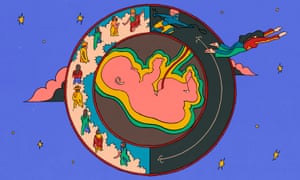Adherents view life not as a gift and a miracle, but a harm and an imposition. And their notion that having children may be a bad idea seems to be gaining mainstream popularity
In February, a 27-year-old Indian man named Raphael Samuel announced plans for an unusual lawsuit. He was going to sue his parents for begetting him. “It was not our decision to be born,” he told the BBC. “Human existence is totally pointless.”
Samuel recently told me over Skype from Mumbai that his is a good life, and he is actually close to his parents. His complaint is more fundamental: he believes it is wrong to bring new people into the world without their consent. He wanted to sue his parents for a symbolic amount of money, such as a single rupee, “to instill that fear among parents in general. Because now parents don’t think before having a child,” he told me.
Samuel subscribes to a philosophy called anti-natalism. The basic tenet of anti-natalism is simple but, for most of us, profoundly counterintuitive: that life, even under the best of circumstances, is not a gift or a miracle, but rather a harm and an imposition. According to this logic, the question of whether to have a child is not just a personal choice but an ethical one – and the correct answer is always no.


No comments:
Post a Comment